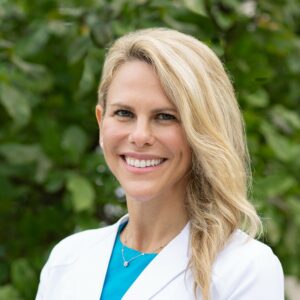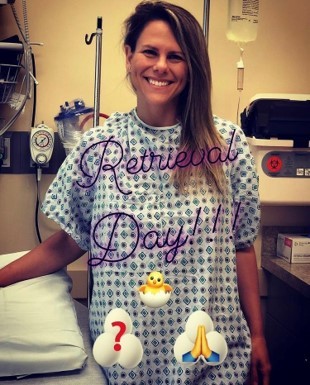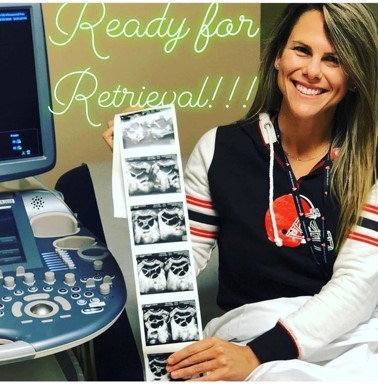
Today we’d like to introduce you to Valerie Libby.
Hi Valerie, we’d love for you to start by introducing yourself.
I am a reproductive endocrinology and fertility physician. I help people create the family they desire whether it is through egg freezing, intrauterine insemination (IUI), in vitro fertilization (IVF), donor eggs, donor sperm, donor embryos, surrogacy- you name it.
I was raised in Atlanta, Georgia and am happy to be serving this community. My father and two brothers are also urologists in the community. I actually come from a very long line of doctors including both grandfathers, two uncles, one aunt, and three cousin! I studied Psychology and Spanish in college and then completed a Master’s in Global Public Health as I thought I would be living abroad for the rest of my life with the goal of increasing access to care and contributing to disease prevention. However, my genes pulled at me, and I decided to return to the States for medical school. Initially I was going to be a pediatrician because I LOVE children, then my personal OBGYN suggested that helping people create families would be a perfect fit for me; I trusted her and instead of spending my summer working on pediatric vaccines at the CDC, I pivoted to working in a fertility clinic. The moment I walked into the clinic I fell in love with this field of medicine. She was right about the fit, I realized immediately this is me – psychology merged with helping people create children. Furthermore, I love being at the forefront of medicine and technology and the fertility medicine is a newer field with technology advancing daily.
When I learned about egg freezing, my world changed. Not only because I knew I needed to do it for myself, which I did for the first time at age 28, but because it quenches my passion for preventative medicine from my MPH studies- it helps PREVENT age-related infertility which is the biggest issue with infertility. After this revelation, I realized I needed to work extremely hard to achieve my goal of working in this competitive and small field, and I did. This included 4 years of OBGYN residency followed by 3 years of reproductive endocrinology and infertility fellowship in Ohio. Finally, at the age of 35, I graduated fellowship and got my first job as a fertility doctor back home in Atlanta. I joined an incredible practice called Shady Grove Fertility, one of the biggest practices in the country.
At that point, I had had about five serious relationships, but none that ever stuck. Luckily by then I had 40 frozen eggs, so I definitely felt less pressure to settle for the wrong partner. I finally met the RIGHT guy on a dating app last year and we just got engaged! We have a dog and a cat and are really excited to start using my younger, frozen eggs and making a family of our own.
I have a bustling practice and absolutely LOVE my job. There is literally no job that is better suited for me. I am a HUGE advocate of egg freezing as both a patient and a physician and share about this often on social media.
I’m sure you wouldn’t say it’s been obstacle free, but so far would you say the journey have been a fairly smooth road?
I am extremely lucky to work in a field that I LOVE. However, this was certainly not the easiest path. I would say the BIGGEST challenge I have ever experienced was switching residency programs after my intern year in New York. A few months into my intern year, I went through a difficult break-up and I was miserable. I wasn’t sure if it was Long Island or my residency program or OBGYN residency in general, but I knew I needed a change. A residency spot opened up in Dallas, Texas at the most difficult OBGYN residency program in the country. My best friend was there and I thought I should try to make the change. Going into this residency program starting as a second year was literally the hardest thing I had ever done. There was so much I had to quickly learn to try to catch up with my classmates. My dream of becoming a fertility doctor seemed so far away because not only did I need to get graduate this residency, but I had to do it with great scores, recommendations, and research – and I could barely catch my breath. I studied nonstop and worked incredibly hard to catch up and was able to get into an awesome fertility fellowship.
The other big challenge I faced was not finding the right partner and being able to fulfill my biggest dream of having my own family at the “typical” age. I have 3 brothers and am the second to oldest. I was the last to be engaged and will be the last to be married- at the age of 38. I am so thankful to have young, frozen eggs and want to help all women have this opportunity as well.
As you know, we’re big fans of Shady Grove Fertility. For our readers who might not be as familiar what can you tell them about the brand?
I joined SGF not because it is the largest practice in the country but because it is physician-run. Whereas many new practices are being created by private equity and venture capitalists, this practice is not. We are physician-run and make decisions based on up-to-date, evidence-based medical information. Being the largest practice, we are able to run large studies and are continually publishing data to contribute to the advancement of our field. We also benefit from more than 80 physician opinions and expert knowledge when we have difficult cases. We have monthly journal clubs and are constantly adjusting our medical practice to stay up-to-date. Though we are large, we practice evidence-based, patient-centered care- a unique environment.
What sort of changes are you expecting over the next 5-10 years?
This industry is changing. First of all, infertility is increasing whether it is due to environmental changes or an increase in diagnoses. People are older when they are having their first child. Divorce is increasing. With the increasing need for our field of expertise and the fact that it was not yet covered by insurance companies, many private equity and venture capitalist groups began creating and acquiring fertility practices which can potentially affect the way physicians can practice medicine. Even though there is an increase in need for fertility care, financial barriers continue to impede access to necessary services. Fortunately, over the last few years we have seen more and more patients with insurance coverage. There are now 19 states that mandate fertility insurance coverage. Many employers are also often providing fertility benefits.
Technologically, the field is improving as well. Over the last 10 years, egg-freezing technology has significantly improved. It was previously thought that egg freezing was experimental and that outcomes were not as good as embryo freezing. However, with the advent of rapid vitrification over the last decade, egg freezing is no longer considered experimental and outcomes are almost equivalent to embryo freezing now. Improvements in technology, access to care through financial means, and increasing maternal age at first birth is driving egg freezing popularity and hopefully it continues to grow. Whether it be to align their biological clock with the societal clock, or for medical reasons such as having to undergo cancer treatment, I hope one day women in their mid to late 20s can all freeze their eggs.
Pricing:
- Egg Freezing Packages
- Shared Risk 100% Refund Programs
- Military Discounts
Contact Info:
- Website: https://www.shadygrovefertility.com/our-care-team/doctors/libby/
- Instagram: https://www.instagram.com/valerielibbymd/?hl=en (@valerielibbymd)















